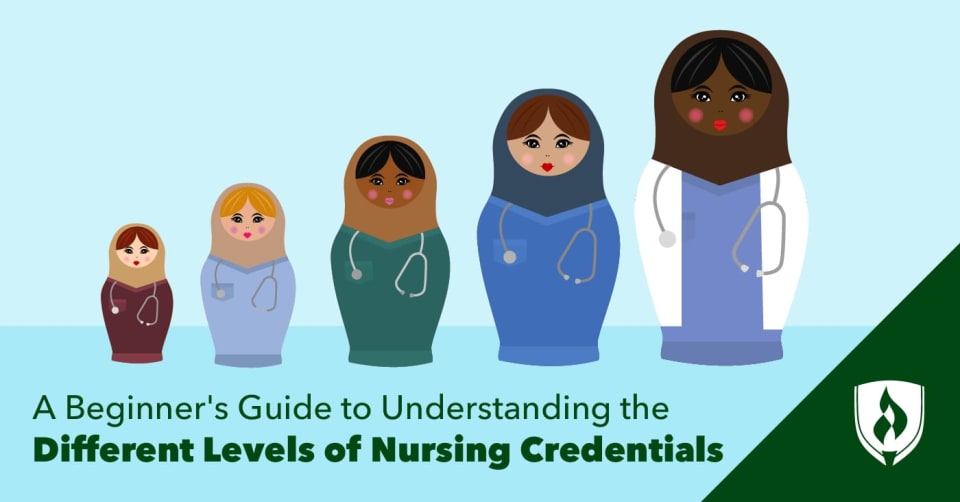A Beginner's Guide to Understanding the Levels of Nursing Credentials
By Brianna Flavin on 05/17/2023

You've started to realize nursing might be the career you've been looking for. You can really help people and join an industry with a huge variety of job opportunities. Now all you need to do is find a program and earn your nursing degree, right? If only it were that easy.
Reading about nursing career options can get bewildering fast. The nursing world has so many acronyms, letters may blur together as you research. RN-BSN, ADN, ACNPC-AG...now I know my ABCs? What are the different levels of nursing? Do they all connect to different types of nursing degrees? More importantly, which level of credential should you look into for the nursing career you want?
"Level" here is kind of a misleading term. Nursing doesn't involve one simple ladder of leveling up the way some careers might. Types of nursing credentials are more about scope of nursing practice, area of specialization and the specific degree nurses achieve.
The truth is there are many different levels of nursing degrees and credentials, and many specialties and job titles under each umbrella. And don't even get us started on all the different pathways you could take through those nursing options.
A nursing degree isn't even close to one-size-fits-all. Your nursing journey will have its own path, focus areas and education requirements depending on the role you want.
So how is an aspiring nurse supposed to choose a path? Don't be intimidated by the many credentials you've come across. When it all comes down to it, a nursing career isn't nearly as confusing as it may seem.
We created this handy guide to give you a basic glance at some of the main levels of nursing degrees. Keep reading so you can identify which educational path aligns with your career aspirations.
5 Main levels of nursing practice
The fact that there are so many different credentials in the nursing profession is exciting news. It means there are potential opportunities out there for those wanting to make an impact in the healthcare field—no matter their level of educational attainment. And the options don't end once you're employed, either—you can mold your career to fit your passions and priorities by continuing to ascend the nursing hierarchy later in your career.
Whether you have hopes of specializing, climbing the ranks or pursuing entrepreneurial endeavors, there are types of nursing degrees or certifications available to prepare you for your professional goals.
Let's learn more about the four core levels of nursing.
1. Nursing assistant (CNA)
Nursing assistants also go by the title of nursing aides or CNAs (Certified Nursing Assistants). While these professionals are not technically nurses, they are on the frontline of contact between medical staff and patients—and the role can serve as a starting point for many aspiring nurses. Nursing assistants bathe their patients and help them dress, eat, use the bathroom and perform other daily activities. They measure vital signs and listen to their patients' health concerns and transfer patients between beds and wheelchairs.
Some certified nursing assistants also may dispense medication, according to the Bureau of Labor Statistics (BLS), depending on their state's rules and regulations.1 The BLS adds that CNAs are often the principal caregivers in nursing homes and residential care facilities, having more direct contact with the residents than other staff members.
How to become one: To become a certified nursing assistant, you must complete a state-approved education program. A nursing assistant training program will typically take just a matter of weeks to complete. Upon completion of the program, aspiring nursing assistants must pass an exam to earn their CNA (or related) title. After successful completion, CNAs are state-certified.
Nursing assistant job outlook:
- Projected employment growth (2021–2031):1 5 percent (about average)
For more on this role, check out What is a CNA? The Perfect First Step for Aspiring Nurses.
2. Licensed practical nurse (LPN)
LPNs, sometimes known as licensed vocational nurses (LVNs), are responsible for a variety of patient support duties. They monitor patient health and administer basic care. Their tasks might include taking blood pressure, inserting catheters, starting IV drips (in some states) and changing bandages. They communicate with patients (and sometimes patient family members) to educate them on care plans. State regulations vary for LPNs on administering medication and supervision requirements.
How to become one: LPNs get their start by successfully completing a Practical Nursing Diploma program. These programs can be found at technical schools, community colleges or career colleges and can usually be completed in as few as 12 months. After graduation, you'll be required to pass the National Council Licensure Examination (NCLEX-PN®) to receive your state license and be qualified to work.
Additional certification is also available for nurses at the LPN level. Certifications show that an LPN or LVN has an advanced level of knowledge about a specific subject, according to the BLS.1 To gain an edge in the job market or to acquire some specialty training, LPNs can earn certification in specialized areas like IV therapy, developmental disabilities, childbirth and more.
Licensed practical nurse job outlook:
- Projected employment growth (2021–2031):1 6 percent (about average)
If this nursing career sounds appealing to you, check out What Does an LPN Do? A Closer Look at These Versatile Caregivers.
3. Registered nurse (RN)
Registered nurses (RNs) tend to be the group most people associate with the term "nurse." They assume a wide variety of roles in patient care. RNs are responsible for recording patient medical history, monitoring symptoms and medical equipment, administering medicine, establishing or contributing to a plan of care, performing diagnostic tests and collaborating with doctors.
Some RNs can be responsible for overseeing LPNs, CNAs and other healthcare staff, the BLS reports.1 Specific job titles and duties will vary depending on where they work and the types of patients they care for. There are also opportunities for RNs to limit their work to caring for specific patient populations, such as in pediatric nursing, emergency nursing, neonatal nursing, psychiatric nursing and more.
RNs also have a plethora of choices outside of direct patient care. The BLS notes that registered nurses might also work to promote public health, run health screenings or blood drives, or staff the health clinics in schools.1
How to become one: There are two primary levels of nursing degrees that can lead to a career as an RN: earning an Associate's Degree in Nursing (ADN) or earning a Bachelor of Science in Nursing (BSN). The Rasmussen University ADN program can be completed in as few as 21 months.2 On the other hand, earning your BSN at Rasmussen University could be done in as few as 33 months, or as few as 18 months with a prior degree under your belt.2
When choosing which track to take, it's important to think ahead and determine what the educational preferences are for the type of work you want. Some employers (especially hospitals) prefer RNs to have a bachelor's degree. Many working RNs with an ADN opt to go back to school later to earn their bachelor's degree through an RN-to-BSN online program.
But whichever nursing degree level you decide on, you'll still have to pass the National Council Licensure Examination (NCLEX-RN®) if you want to start working as an RN. Additional requirements may also exist depending on your state, so be sure to look into statewide RN qualifications as well.
Registered nurse job outlook:
- Projected employment growth (2021–2031):1 6 percent
If you think registered nursing might be your path, check out What Does a Registered Nurse Do? Understanding Their Impact.
4. Advanced practice registered nurses (APRNs)
Nurse practitioners, nurse midwives and more nurses fall under the umbrella of advanced practice registered nursing.
If you earn your Master of Science in Nursing (MSN), Master of Science in Nursing Nurse Practitioner (MSN-NP) or Doctor of Nursing Practice (DNP), you can become an advanced practice registered nurse. These nurses have all sorts of options when it comes to career choices. They can work independently as well as in collaboration with physicians, according to the BLS.1 They can perform all of the duties of an RN as well as more extensive tasks like ordering and evaluating test results, referring patients to specialists and diagnosing and treating ailments.
Nurse practitioners, for example, can take on some of the same responsibilities as a physician, though the scope of their nursing practice will vary a bit from state to state. A nurse practitioner can also specialize in areas of nursing they prefer, such as pediatrics, mental health or gerontology.
For a better idea of how these nurses fit in the healthcare system, see this handy breakdown the American Nurses Association® offers to highlight the four types of APRNs: nurse anesthetists, nurse midwives, nurse practitioners and clinical nurse specialists.
How to become an APRN: The first step toward becoming an advanced practice registered nurse is becoming an RN. MSN programs typically require candidates to first have an active RN license, with most preferring a BSN degree, according to the BLS.
APRN roles include nurse anesthetist, clinical nurse specialist, nurse midwife and nurse practitioner (NP). Specific graduate programs exist for each of these outcomes. For instance, prospective nurse practitioners enroll in a program that aligns with specialized licensure options like psychiatric-mental health, adult gerontology, pediatrics or family primary care.
Once you decide which APRN career option to pursue, you'll need to gain acceptance into an accredited MSN or DNP program and earn your degree. Depending on the specialty you wish to pursue, there might be further requirements in order to obtain licensure, including clinical experience or additional certification.
After graduation, the BLS states that you'll likely need to pass a national certification exam in your area of expertise. Requirements vary slightly by state, so check out the National Council of State Boards of Nursing® for specifics in your area. Some advanced practice certifications will also need to be renewed after a certain number of years to remain valid.
Advanced practice registered nurse (nurse anesthetists, nurse midwives and nurse practitioners) job outlook:
- Projected employment growth (2021-2031)1: 40 percent (much faster rate than average)
5. Nursing leadership careers
Nursing career advancement can also involve shifting away from direct nursing practice into nursing leadership, management, education and even policy-making roles. MSN and DNP nurses can influence healthcare from these powerful positions, creating changes and improved healthcare outcomes for the future.
One option is to become a nurse educator and help train the next generation of nurses. Another possibility is to become a director of nursing or a director of public health.
Many nursing programs will include specialization options for their MSN programs and DNP programs. These specializations can help you launch into the sector of nursing leadership that most excites you.
Find your ideal level of nursing degree
This simple breakdown of the different levels of nursing should help you have a better understanding of your options in the field. Even so, these only scratch the surface of the career options available within each level.
Now that you're more familiar with the nursing hierarchy, you may have a better idea of which path you'd like to pursue. Regardless of which level of nursing credential you choose, completing the TEAS test is a common education requirement you'll likely encounter. Learn more about what to expect from the exam in our article "Don't Fear the TEAS Test: 5 Common Questions Answered."
Check out our articles "What Is a Magnet Hospital? What You Need to Know About This Polarizing Healthcare Designation" and "How to Become a CNA Instructor in Florida: 4 Steps to This Rewarding Role".
1Bureau of Labor Statistics, U.S. Department of Labor, Occupational Outlook Handbook [career information accessed April 2023]. Data represents national averaged earnings for the occupations listed and includes workers at all levels of education and experience. Employment conditions in your area may vary.
2Time to completion is dependent on number of transfer credits accepted and the number of courses completed each term.
EDITOR'S NOTE: This article was originally published in 2015. It has since been updated to include information relevant to 2023.
National Council of State Boards of Nursing, NCLEX, NCLEX-PN and NCLEX-RN are registered trademarks of National Council of State Boards of Nursing, Inc.
American Nurses Association is a registered trademark of American Nurses Association Corporation.




